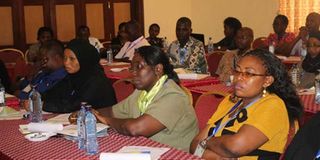NCIC urges schools to start peace clubs to help fight extremism

Participants attending a two-day capacity building workshop in peace organised by NCIC in Mombasa. NCIC urged teachers to start peace clubs in schools in order to fight negative ethnicity and religious extremism among the youth. PHOTO | WACHIRA MWANGI | NATION MEDIA GROUP
What you need to know:
- The clubs, dubbed Amani Club will be used as avenues of promoting good relations, harmony and peaceful co-existence amongst students and teachers.
- He was speaking during a daylong training for teachers, religious leaders and other stakeholders at the Pride Inn hotel.
- Knut Coast executive member Dan Aloo recommended that the government includes peace subjects in the curriculum.
- Kuppet Mombasa Executive Secretary Linet Amadi observed that divisive politics and dysfunctional families were promoting violent behaviour among students in schools.
The National Cohesion and Integration Commission (NCIC) has asked Coast teachers to establish peace clubs in schools as a way of fighting negative ethnicity and religious extremism among the youth.
The Commission Secretary Hassan Mohammed said the clubs, dubbed Amani Club will be used as avenues of promoting good relations, harmony and peaceful co-existence amongst students and teachers.
“We want you to inform these youth at school more so from Coast that they will only make situations worse in their region by creating instability through engaging in violent activities.
"Let them understand that the more problems there are, the more unemployment we will have as well,” the NCIC boss said.
He was speaking during a daylong training for teachers, religious leaders and other stakeholders at the Pride Inn hotel.
He urged the participants to use the club to inculcate skills of good citizenship, dispute resolution and peer mediation structures on learners that will eventually reduce their involvement in violence.
He noted that despite the commissions’ efforts to promote peaceful relations since its inception, negative ethnicity was still rife.
He said this was evident in the way political parties are organised along ethnic and regional lines.
Values of tolerance, appreciation and embracing unity in diversity have also been eroded, he added.
“We did a research recently on the cohesion index and, sadly, it showed that trust amongst people is going down but we can help Kenyans tolerate each other by curbing hate speech and sensitising the youth on the dangers of radicalization,” he said.
He however advised teachers to use languages and teaching styles that are moderate and factual and cautioned them against using accusatory statements during lessons and when conducting club activities.
DIVISIVE POLITICS
Kenya Union of Post-Primary Education Teachers (Kuppet) Mombasa Executive Secretary Linet Amadi observed that divisive politics and dysfunctional families were promoting violent behaviour among students in schools.
“It’s about time that we promote teacher-parent relationship at school level such that if a student comes from a family where there are conflicts, he or she knows that there is another ‘father’ he has in school whom he or she can talk to,” the Kuppet official said.
She urged teachers to develop close relationships with their students.
Kenya National Union of Teachers (Knut) Coast executive member Dan Aloo recommended that the government includes peace subjects in the curriculum.
“When students are at peace with one another and the environment is also peaceful, then academic performance also goes up,” said Mr Aloo.
Mombasa County Assistant Director of Education Newton Okwatsa said Amani clubs will shape the character of students through, among other teachings, guiding them to respect diversity in the society.
Mombasa County Commissioner Nelson Marwa and officials from the county government are expected to close the workshop Friday.
NCIC has also conducted similar trainings in Kwale, Kitui, Eldoret and Isiolo.





